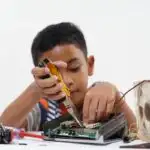In the annals of education, the surprising historical fact emerges that homeschooling was once illegal.
In order to unravel the complicated web of why that was the case, we must journey through time, exploring the social, political, and educational landscapes that cast a shadow over homeschooling.
Buckle up – let’s get started.

A Glimpse Into The Educational Landscape
In the early 20th century, a standardized education system was the prevailing norm and was perceived as being essential for creating uniformity and ensuring a consistent level of education for all students.
This rigid structure became the benchmark against which alternative education methods, including homeschooling, were measured.
Homeschooling, as a deviation from this norm, faced widespread skepticism as critics argued that a homogenized education system was crucial for fostering national unity and shared values, and any deviation from this path was considered a potential threat to the cohesion of society.
Social Constructs And Conformity
During this period, societal norms played a pivotal role in shaping public perception, and education wasn’t merely about knowledge acquisition; it served as a tool for socialization.
Critics of homeschooling contended that it inhibited a child’s exposure to diverse perspectives, potentially hindering their ability to adapt to societal norms, and the unfounded fear that it could forge isolated individuals who didn’t conform to societal expectations fueled the idea that it could be harmful to an already established status quo.
The Emergence Of Homeschooling
As dissatisfaction with traditional schooling grew, families sought alternatives and motivated by reasons such as religious beliefs, concerns about the quality of education, or a desire for personalized learning; some families began to explore the idea of homeschooling.
This wholesale shift in attitude marked the emergence of an educational movement that would eventually challenge the illegality of homeschooling.
Government Intervention: Protecting And Maintaining The Common Good
Legal prohibition of homeschooling was often justified on grounds of safeguarding the common good, and authorities argued that a standardized education system was crucial for ensuring that all citizens received a consistent level of education.
By doing this, they believed that adherence to this principle would foster a sense of national unity and shared values, which would contribute to a harmonious society.
At least, that was the theory. In reality, the practice of education has never been about ensuring that the educational playing field is level but has more to do with ensuring that the educational system can attribute roles and ideas to individuals based on its ideological assumptions and theories.
Fear Of Unchecked Influence
Critics expressed concerns about the potential for unchecked influence within homes, and the lack of oversight and regulation in homeschooling raised fears that it could lead to the propagation of extremist ideologies or the spread of misinformation, neither of which were considered to be beneficial to society as a whole, so governments saw it as their duty to ensure that all students received an education adhering to certain standards.
The Tussle Between Parental Rights And State Authority
At the heart of the debate lay a fundamental question: to what extent should the state intervene in family affairs?
Advocates for homeschooling asserted their rights as parents to choose the educational path they deemed best for their children, but authorities believed that the state had a duty to ensure that children received an education that could and would (at least in their eyes) prepare them to become productive members of society.
Further reading: The best states for homeschooling.
Religious Undertones: A Clash Of Beliefs
Religious convictions played a substantial role in the pushback against homeschooling restrictions, as families with strong religious affiliations argued that traditional schools did not align with their values and, in some cases, went against their religious teachings and the clash between religious freedom and state-mandated education fueled heated debates which are still raging to this day.
The separation of church and state and the way the latter interferes with the former was always at the forefront of the homeschooling battle due to the discrepancy of beliefs that could often occur between the ideology of various different faiths and the need to create and follow, a one size fits all system of learning.
Pioneers Of Change: Legal Battles For Homeschooling Rights
The prohibition of homeschooling did not go unchallenged, and pioneering individuals and advocacy groups embarked on legal battles to secure the right to homeschool.
As landmark cases emerged, each contributed to the gradual erosion of the legal barriers that stood in the way of this alternative form of education.
As societal attitudes evolved and the benefits of homeschooling became more apparent, perspectives began to shift, especially when research studies emerged, shedding light on the academic achievements and social development of homeschooled children and this shift in perception was largely responsible for paving the way for reconsideration of homeschooling regulations.
The Turning Tide: Legal Recognition Of Homeschooling
The journey from illegality to legal recognition was marked by incremental changes, and legislators, influenced by the growing body of evidence supporting homeschooling, started to revise laws.
This slowly turning tide saw the emergence of regulations that struck a balance between parental rights and the state’s duty to ensure the welfare of its students and the future citizens that would help shape it.
The significant technological advancements of the twentieth century also played a crucial role in reshaping the landscape of education, especially that of homeschooling, as the advent of the internet and digital resources provided homeschooling parents with unprecedented access to educational materials, which allowed for more diverse and tailored approaches to learning, that challenged the notion that homeschooling could not provide a comprehensive education.

Global Perspectives On Homeschooling Legality
While our exploration has predominantly focused on the historical context of homeschooling legality, it’s essential to acknowledge that perspectives on homeschooling legality vary globally as different countries have approached the issue with distinct policies and regulations, and some nations have embraced homeschooling as a legitimate educational choice, while others continue to impose strict regulations or outright bans.
The Role Of Homeschooling In Addressing Special Needs
As the understanding of diverse learning needs expanded, homeschooling emerged as a viable option for families with children facing challenges in traditional educational settings, and the personalized attention and flexibility inherent in homeschooling proved beneficial for children with special needs, challenging the notion that one-size-fits-all in education.
It also answered a long-standing question of how children with special needs could receive the same level of education as children without any learning disabilities or issues, without the former “holding back” the latter and the latter having to “suffer” and learn at the same pace as the former.
Homeschooling was, and is, to coin a phrase, a solution to the issue that was always present, but no educator wanted to discuss it in a public forum.
Economic Factors And Homeschooling
Economic considerations have also played a role in the evolution of homeschooling, and families facing financial constraints might opt for homeschooling as a cost-effective alternative to private education as homeschooling allows parents to maintain employment flexibility, accommodating diverse family structures and financial situations.
Homeschooling And Academic Excellence: Debunking Myths
Over the years, studies have consistently challenged preconceived notions about the academic performance of homeschooled children, but contrary to early concerns, research indicates that homeschooled students often perform at or above the level of their traditionally schooled counterparts, and the debunking of these myths has contributed to a more favorable view of homeschooling as a legitimate and effective educational approach.
As legal frameworks adapted to the changing educational landscape, there emerged a need to strike a lasting balance between ensuring educational standards and respecting the autonomy of homeschooling families, which is why modern regulations aim to provide guidance that guarantees certain benchmarks while allowing for flexibility that makes homeschooling an attractive option for many families.
Cultural Shifts: Embracing Educational Diversity
In recent years, there has been a notable cultural shift towards embracing educational diversity; as society becomes more accepting of various approaches to learning, including homeschooling, the legal barriers that once restricted this choice have continued to crumble, which reflects a broader recognition that the best educational approach may vary from child to child.
This has been especially true since the integration of technology into education has become a defining feature of the 21st century, and homeschooling has adapted to this digital age, leveraging online resources, virtual classrooms, and interactive learning platforms.
The digitalization of homeschooling not only provides access to a vast array of educational materials but also facilitates a more personalized and dynamic learning experience.
Digital tools enable homeschooling parents to tailor the curriculum to the individual needs and learning styles of their children through the use of interactive apps, virtual experiments, and multimedia presentations, which bring subjects to life, making learning engaging and enjoyable.
Furthermore, the digital age has connected homeschooling communities globally as online forums, social media groups, and virtual meet-ups create a supportive network for parents, fostering collaboration and resource-sharing.
This interconnectedness enhances the homeschooling experience, providing a sense of community that was once challenging to achieve in traditional homeschooling settings.
It has also meant that the traditional chasm that existed between “normal” schooling and homeschooling has narrowed, as parents are able to access the same resources as educators, which means that the only real difference between some homeschooling programs and those taught in schools is their location.
Addressing Global Perspectives And The Future Of Homeschooling Legality
While we have delved into the historical context of homeschooling legality, a broader perspective on global attitudes towards homeschooling is essential as different countries approach homeschooling with distinct policies and regulations.
Understanding the global landscape sheds light on the cultural, societal, and governmental factors that influence the acceptance or rejection of homeschooling and emphasizes that the legality and perception of homeschooling are shaped not only by historical context but also by a country’s unique socio-political environment.
Looking towards the future, homeschooling stands at the intersection of tradition and innovation; as technological advancements continue to redefine education, homeschooling will likely evolve further, and artificial intelligence, virtual reality, and adaptive learning technologies hold the potential to revolutionize how homeschoolers access and interact with educational content.
Moreover, the ongoing cultural shift towards accepting diverse educational approaches suggests a positive trajectory for homeschooling.
As societal attitudes become more inclusive, legal frameworks will likely continue to adapt, further legitimizing and supporting homeschooling as a viable educational choice.
See also: What Is Eclectic Homeschooling?
In Summary
Our comprehensive exploration of why homeschooling was once illegal reveals a nuanced narrative that details the changing views of society as a whole.
From established norms and fears of deviation to legal battles and evolving perspectives, the journey of homeschooling has been fraught with challenges, but the resilience of those advocating for educational autonomy, coupled with shifting and evolving attitudes and the recognition of homeschooling’s merits, has led to a transformation in its legal status.
As we traverse the intricate tapestry of history, it becomes evident that the story of homeschooling is not just about its legalization but about the continuous negotiation between individual freedoms, the mainstream zeitgeist, and the constantly changing field of education.
The intricate dance between these elements has shaped the present landscape of homeschooling, which has contributed to its acceptance as a legitimate and valuable educational choice for both students and their home-based teachers.
Further reading: Homeschooling vs unschooling – what’s the difference?
- Homeschooling In High School: Pros And Cons - February 24, 2024
- How Do I Withdraw My Child From School To Homeschool? - February 23, 2024
- How To Not Go Crazy Homeschooling Kids: A Guide For Frazzled Parents - February 22, 2024









Leave a comment